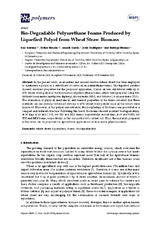Bio-Degradable Polyurethane Foams Produced by Liquefied Polyol from Wheat Straw Biomass
Autor
Serrano, Luis
Rincón, E.
García, Araceli
Rodríguez, Jesús
Briones, Rodrigo
Editor
MDPIFecha
2020Materia
Wheat strawLiquefaction
Foams
Biodegradability
METS:
Mostrar el registro METSPREMIS:
Mostrar el registro PREMISMetadatos
Mostrar el registro completo del ítemResumen
In the present work, an abundant and unused residue (wheat straw) has been employed to synthesize a polyol as a substituent of castor oil in polyurethane foams. The liquefied product showed excellent properties for the proposed application. Castor oil was substituted with up to 50% wheat straw polyol in the formulation of polyurethane foams, which were prepared using two different isocyanates (methylene diphenyl diisocyanate (MDI) and toluene-2,4-diisocyanate (TDI)). The evaluation of physical, mechanical, and thermal properties of the foams revealed that these materials can successfully be formed with up to 40% wheat straw polyols since all the results were improved. Moreover, at this polyol concentration, the morphology of the foams was presented as a compact and ordered structure. Following this trend, the foams showed excellent biodegradability at 30 days (5.60 and 7.31% for TDI and MDI foams, respectively) and 60 days (8.49 and 9.88% for TDI and MDI foams, respectively) in the soil media tests carried out. Thus, the materials prepared in this work can be proposed for agricultural applications such as use in plant nurseries.

